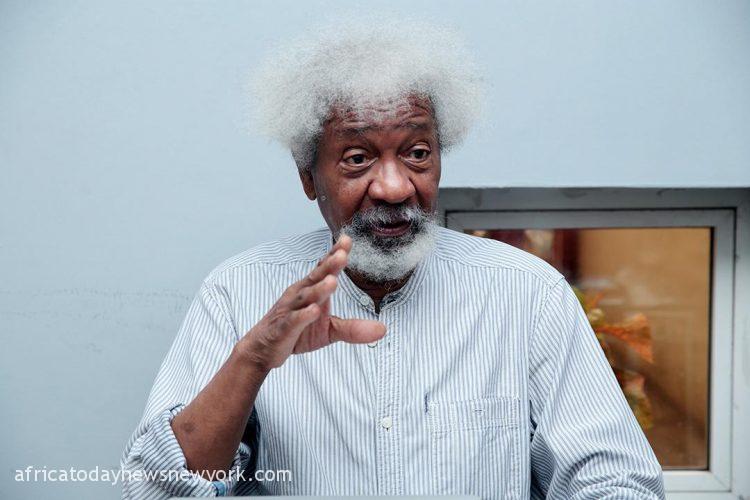Nobel laureate, Prof. Wole Soyinka has aired his view on the Muslim-Muslim ticket audaciously picked by the All Progressives Congress (APC) presidential candidate, Tinubu; the Nobel laureate says its irrelevant where the next president, vice president, and speaker of the House of Representatives of Nigeria originate from or what religion they practice.
In a pre-recorded interview that aired on Monday, Soyinka spoke on Channels Television program which was monitored by Africa Today News, New York.
‘I don’t give a damn if the president, the vice-President, the speaker, etc all come from the same village, they have the same religion, they belong to the same tribe,’ Soyinka said when asked about his thoughts on the controversy that has trailed the Muslim-Muslim All Progressives Congress presidential ticket.
The writer further said, ‘If, however, it is transparently, absolutely, unarguable that is a kind of genius breed that has been donated to the nation and to the world. As long as the capability of the individuals who are into governance is proven, and it is quite clear that there is no alternative, that is my position.’
However, the 88-year-old dramatist pointed out that Nigeria hasn’t yet reached a ‘norm’ and that the same faith ticket won’t really matter in a ‘normal society.’
‘Now, we are talking about a society which is normal, which institutions are normal…Is Nigeria normal?’ he asked.
He stated that the candidates running on a same-faith ticket should be “very sensitive to the very peculiar circumstances of Nigeria” and investigate options that have been proven successful for the nation.
Soyinka’s remarks came months after Kashim Shettima, the former governor of Borno State, was named as Bola Tinubu’s vice presidential candidate for the APC presidential nomination. The fact that Tinubu and Shettima are Muslims has drawn harsh opposition from a number of groups, including the Catholic Bishop of Sokoto Diocese, Matthew Kukah, the Pentecostal Fellowship of Nigeria, and the Christian Association of Nigeria.
Top Christian APC members from the northern region have also rejected the mix of Tinubu and Shettima. The top chieftains include former Secretary to the Government of the Federation, Babachir Lawal; former Speaker, House of Representatives, Yakubu Dogara; former Minister of Youths and Sports Development, Solomon Dalung; Senator Ishaku Abbo (Adamawa North).
The pairing of Tinubu and Shettima has also been opposed by prominent Christian APC members from the northern area. The top leaders include former Speaker, House of Representatives, Yakubu Dogara; former Minister of Youths and Sports Development, Solomon Dalung; Senator Ishaku Abbo (Adamawa North) Secretary to the Government of the Federation, Babachir Lawal.
Soyinka claimed during an appearance on Channels Television that there are unstated agreements that represent the diversity and peculiarities of Nigeria, and that the ruling party ought to have been attentive enough to recognize these arrangements and prevent unnecessary dispute.
He said, ‘We’ve had unspoken arrangements in recognition of the peculiarity of this particular society. And so, it shouldn’t surprise you or me that a number of people find that kind of choice very questionable and unwise, especially at this time.’
‘I can understand that perfectly and at the same time, I recognize the right of the proposed incumbent to choose who he wants to run with if he gets ultimately into power. That is right is there? However, that right is not absolute because we are talking about a relative society which Nigeria is right now.’
‘And so, we are in a very difficult situation and the question I ask now is: why create a controversy? Are there options that should have prevented such a controversy? Why not be very sensitive to the very peculiar circumstances of Nigeria?’ he questioned.
According to Soyinka, Nigeria is experiencing a religious crisis, ethnic mistrust, and class mistrust, and politicians should take advantage of the opportunity to avoid making matters worse by studying nations like Lebanon that took lessons from their civil war and established zones to produce government officials.

